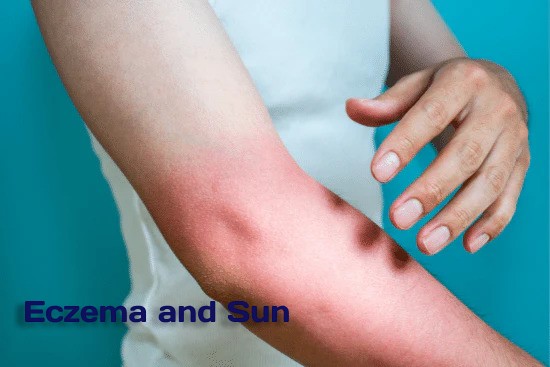
Introduction
When you’re dealing with eczema, managing your skin isn’t just about daily care—it’s also about navigating seasonal changes. From dry winter air to the humid heat of summer, every season presents unique challenges for eczema sufferers. But did you know that eczema sun exposure can also play a critical role in either soothing or aggravating your skin? Let’s dive into how different seasons affect eczema and what you can do to keep your skin happy year-round.
Winter and Eczema
How Cold Weather Impacts Eczema
Winter might look cozy, but for your skin, it’s often the harshest season.
- Dry Skin and Reduced Humidity
The cold air outside and low humidity levels suck the moisture out of your skin, leaving it dry, itchy, and prone to flare-ups. - Indoor Heating and Its Downsides
While heating keeps you warm, it also strips moisture from the air, creating a double whammy for eczema sufferers.
Tips for Managing Eczema During Winter
- Importance of Moisturization
Use rich, nourishing creams multiple times a day to lock in hydration. - Wearing Proper Clothing
Opt for soft, breathable fabrics like cotton to prevent irritation.
Summer and Eczema
Effects of Heat and Sweat on Eczema
- Sweat-Induced Irritation
Heat and sweat can cause your skin to itch like crazy, potentially leading to painful flare-ups. - The Role of Sunburn
Overexposure to sunlight without protection can aggravate eczema, causing redness and peeling.
Managing Eczema in the Summer
- Staying Cool and Comfortable
Loose-fitting clothes and frequent showers can help minimize discomfort. - Benefits of Eczema Sun Exposure
Moderate sun exposure can reduce inflammation and itchiness, thanks to the healing properties of UV light.
Spring and Eczema
Allergens and Flare-Ups
- Pollen and Its Effects
Spring allergies can irritate eczema, leading to increased redness and inflammation. - How to Minimize Exposure
Keep windows closed during high-pollen days and rinse off after being outdoors.
Seasonal Skin Care Tips for Spring
- Using Lightweight Moisturizers
Transition to lighter creams to match the mild weather. - Allergy Management Techniques
Use antihistamines or consult a doctor to manage seasonal allergies.
Autumn and Eczema
Transition Period Challenges
- Changing Temperatures and Their Effects
Fluctuating weather can confuse your skin, making it more reactive. - Adjusting Skincare Routines
Introduce heavier moisturizers as the air becomes drier.
How to Prepare for Cooler Days
- Focus on Barrier Repair
Look for products that strengthen your skin barrier. - Building a Seasonal Skincare Routine
Layer hydrating serums under your moisturizer to boost hydration.
The Role of Sunlight in Eczema
Positive Effects of Sunlight on Eczema
- UV Light Therapy
Controlled UV light exposure can help reduce eczema symptoms. - Reducing Inflammation
Sunlight’s anti-inflammatory properties can soothe irritated skin.
Risks of Excessive Sun Exposure
- Sunburn and Skin Damage
Overdoing it can lead to burns and exacerbate eczema. - Safe Sun Practices
Always wear sunscreen and limit exposure during peak hours.
Treatment Strategies for Eczema Across Seasons
General Skincare Tips
- Hydration and Moisturization
No matter the season, keeping your skin hydrated is essential. - Fragrance-Free Cream Options
Invest in a fragrance-free cream to avoid further irritation.
Adjusting Treatments Based on Weather
- Layering Skincare Products
Adapt your routine with additional steps like serums or oils during dry months. - Incorporating Seasonal Ingredients
Use aloe in summer and oatmeal-based products in winter for added relief.
Conclusion
Dealing with eczema doesn’t have to feel like a never-ending battle. By understanding how different seasons affect your skin and taking proactive steps, you can manage flare-ups more effectively. Whether it’s embracing the benefits of eczema sun exposure or adjusting your routine for seasonal changes, consistency is key. Your skin deserves year-round care, and with a little effort, you can keep it looking and feeling its best.
FAQs
- How does sunlight benefit eczema?
Moderate sunlight can reduce inflammation and improve symptoms by calming irritated skin. - Can eczema worsen with seasonal changes?
Yes, seasonal changes often trigger flare-ups due to varying humidity, allergens, and temperature. - What are the best moisturizers for eczema in winter?
Opt for rich, fragrance-free creams to lock in hydration during the colder months. - Is UV therapy safe for treating eczema?
When done under medical supervision, UV therapy can be an effective treatment for reducing symptoms.
5. How can I minimize sweat irritation in summer?
Wear loose clothing, stay hydrated, and rinse off sweat promptly to prevent irritation.





Leave a Reply